2018年湘少版英语六年级下册1-10单元知识点归纳
湘少版六年级下册知识清单
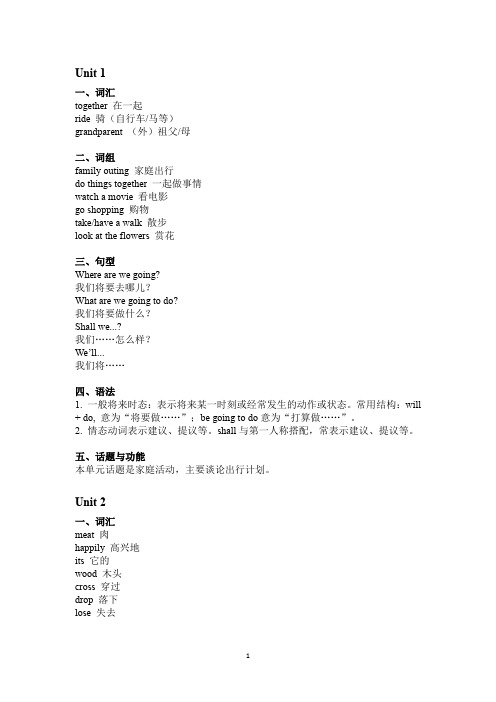
Unit 1一、词汇together 在一起ride 骑(自行车/马等)grandparent (外)祖父/母二、词组family outing 家庭出行do things together 一起做事情watch a movie 看电影go shopping 购物take/have a walk 散步look at the flowers 赏花三、句型Where are we going?我们将要去哪儿?What are we going to do?我们将要做什么?Shall we...?我们……怎么样?We’ll...我们将……四、语法1. 一般将来时态:表示将来某一时刻或经常发生的动作或状态。
常用结构:will + do, 意为“将要做……”;be going to do意为“打算做……”。
2. 情态动词表示建议、提议等。
shall与第一人称搭配,常表示建议、提议等。
五、话题与功能本单元话题是家庭活动,主要谈论出行计划。
Unit 2一、词汇meat 肉happily 高兴地its 它的wood 木头cross 穿过drop 落下lose 失去二、词组a piece of 一块三、句型That piece of meat is better than mine.那块肉比我的好。
Some stories are more interesting.有些故事更有趣。
I like swimming more than running.比起跑步,我更喜欢游泳。
四、语法事物的比较:1. A is/are more... than B. A比B更……2. I like A more than B. 相比B,我更喜欢A。
五、话题与功能本单元是故事,主要用过去时态讲述故事。
Unit 3一、词汇healthy 健康的keep 保持exercise 锻炼;练习jog 慢跑二、词组take care of 照顾keep our body clean 保持身体清洁eat healthy food 吃健康的食物feel happy 心情愉悦do exercise 运动;锻炼三、句型We should learn to take good care of ourselves.我们应该学会照顾自己。
湘少版小学英语六年级复习知识点

湘少版小学英语六年级复习知识点文稿归稿存档编号:[KKUY-KKIO69-OTM243-OLUI129-G00I-FDQS58-湘少版(湖南少年儿童出版社出版)小学英语教材知识点,使用湘教版小学英语教材六年级(de)老师应该用得着,这些知识点还是很全面(de),希望对您有所帮助.1.字母:(大小)辨认、书写顺序;元音字母:A a , Ee, Ii, Oo, Uu2. 数字:1~999(de)基数词和序数词(de)运用,如计算、购物、时间、日期等.句型:①What's your number②What’s the time③How many pens are there④How old are you⑤How much is it⑥How tall are you⑦How heavy are you⑧What time do you get up⑨When's your birthday⑩What time did you see him3. 颜色:单词:red, pink, yellow, brown, blue, purple, orange, black, white, green.句型:①What colour is it②What’s your favourite colour4. 时间:年、季节、月、星期、日、时刻:Season( spring, summer, autumn, winter)Month: January, February, March, April, May, June, July, August, September, October, November, December.Week:Sunday, Monday, Tuesday, Wednesday, Thursday, Friday, Saturday.Day:1st May (the first of May), May 2nd ( May the second)句型:见话题2.5. 食品与饮料:人对食品与饮料(de)喜好;东西方食品.句型:①I like biscuits.②I’d like a cold drink.③Would you like some buns④Do you want some rice⑤This isn’t my food.6. 服装:服装(de)颜色:人对服装(de)喜好;某人(de)穿戴;所属关系;位置等.句型:①I like the green T-shirt.②Where’s my new cap③Who’s shirt is this④Is this your hat7.物品:名词(de)单、复数;特点、颜色、所属关系;存在(de)位置(in, on, under, beside, behind, in front of, above, near, inside, outside).玩具(toy car, doll, )文具(desk, book, bag ,pen, pencil, pencil-box, ruler, pencil sharpener,)句型:①What’s this②What colour is it③Whose is this④This is my brother’s painting.⑤I have a puppet.⑥There's a car near the hospital.⑦Was it in the wardrobe⑧Is there a book on the desk⑨That's not mine.8.动物和植物:cat, dog, duck, fish, sheep, bird, panda, monkey, rabbit, hen , cock, chick, tiger, lion, pig, cow , mouse (mice), elephant, ladybird, puppy, tree, flower, rose,9. 建筑与场所:factory, hospital, park, house, library, museum, office, farm, post office, bank, police station, railway station, bookstore, school, classroom, skating rink, café, house(ba throom, living-room, sitting-room, bedroom,kitchen),garden…10. 身体:head, hair, eye, nose, ear, mouth, neck, hand, finger, foot(feet) ,toe…外貌: fat, thin, tall, short, old, young, two big blue eyes, long hair, short hair, black hair. 句型:①This is my nose.②Touch your head.③Raise your arm.11. 个人情况:姓名、年龄、地址、特点与爱好.句型:①I'm twelve years old.②My hobby is reading.③I like music.④I'm interested in space.⑤My name is Peter.⑥I'm tall and thin.⑦Do you have any hobbies12. 家庭、亲属和朋友:姓名、年龄、地址、职业、特点与爱好、与你(de)关系family, grandfather(grandpa/granddad), grandmother(grandma/grand mum), father, mother, brother, sister, uncle, aunt, cousin, friend.句型:①Who's heHe's my father.②He's a doctor③He likes playing games.④My father helps me.⑤Is he a soldier⑥What’s he13. 学校:学校建筑和学校生活.school, classroom, library, playground, Chinese, maths , English, music, computer, PE, art, science,句型:①When do you go to school②What time do you have English14. 情绪和身体状态:happy, sad, tired, angry, shy, sorry, well, sick,句型:①I'm sick.②I'm happy.③We are sorry.④ I feel sad.15. 社交礼仪:礼貌用语;询问与应答.句型:问候①Hello./ Hi.②Good morning/afternoon/evening.③How are you ④How do you do⑤Glad to meet you./ Nice to meet you.介绍①My name is…②I’m a pupil.③I’m 12.④This is our teacher, Miss Chen.⑤He is from Japan.道别①Goodbye./Bye.②See you.③Good night.道谢①Thank you./Thanks.②You’re welcome.道歉①Sorry.②I’m sorry.③Excuse me.请求①Can I have a puppy ②Can I borrow a pencil ③Yes, please.④Of course.祝愿①Happy birthday.②Merry Christmas.提供帮助①Can I help you ②What can I do for you ③What’s the matter寻求帮助和建议①What can I do用餐①Do you want some soup ②Would you like some rice ③I'd like a cold drink.购物①Which one do you want ②Can I look at it ③I want a red one, please.④It's too expensive.⑤Have you got enough money⑥How much is it16.国家与国庆日:China, Japan, America (the USA), English( the UK), Australia, Russia, Canada, Singapore, India, France,句型:①When’s your country’s National Day②I come from China.17.天气与气候特征:hot, cold, cool, warm, sun, sunny, rain ,heavy rain, rainy, wind, strong wind,windy, snow , heavy snow, cloud, cloudy, …句型:①What's the weather like②It’s a cold day.③Spring is warm and nice.④Tomorrow will be rainy.⑤I like a sunny day.18. 节日:节日(de)特点;节日(de)活动.New Year's Day, Spring Festival, Children's Day, Mid-autumn Festival, Teachers' Day , National Day, Christmas Day, Dragon Boat Festival.19. 正在发生(de)事情:现在进行(de)动作和发生(de)事.句型:①Are you making a kite②Peter is writing.③What's Anne doing④Where are you going⑤What are they doing⑥Is he running20.日常生活:日常生活、工作、学习(de)活动.句型:①I come to school by bus.②Your homework is good.③What time do you get up④She always get up early.21. 计划与打算:计划和将要进行(de)动作be going to do …句型:①I’m/You’re /He’s/She’s /We’re/They’re (not) going to swim.②Are you going to swim③Is he/she going to visit Anne④What are you going to do⑤What is he going to do⑥When are they going to swim⑦Tomorrow will be rainy.⑧ I'll stay at home.22. 能力和可能:能做某事或可能进行某事.句型:①Can you read and write in English②Can I have a puppy③What can you do④She can run fast.23. 过去发生(de)事情或过去(de)打算:过去式.句型:①Where were you②Who was first③Was it in the wardrobe④Benny took my ball.⑤Where did you go⑥What did you do⑦I came by plane.⑧Anne wanted to skate.24. 对事物(de)比较:比较级和最高级.句型:①My singing is louder than yours.②I’m taller than you.③There more shops in Picture One.④Some stories are more interesting than others.⑤The most interesting stories.⑥Who is fatter25.提醒与告示:①What does that sign mean②Draw a cat on the roof.③Don't put your feet on the seat.④No speaking.⑤Do not go in.26.擅长和喜欢(de)事情:①I'm/ You're/ He's good at drawing.②I like playing basketball.。
小学英语6年级下册湘少版知识点汇总

小学英语6年级下册湘少版知识点汇总一、be (not) good at doing sth. (不)擅长做某事You’re good at drawing, Peter. 你擅长画画,皮特。
动名词表爱好:swimming 游泳jumping 跳跃playing table tennis 打乒乓球fishing 钓鱼drawing 画画二、want to do sth. (想要做某事)Anne wanted to skate. 安想要滑冰。
Anne wanted to learn skating. 安想要学滑冰。
Anne wanted to try again. 安想要再试一次。
动词原型:mend clothes 缝衣服read books 读书clean car 洗车fly kites 放风筝play computer games 玩电脑游戏三、look(s) like (看起来像。
)Our earth looks like this from space. 从太空看,我们的地球看起来像这样。
It looks like the sky. 它看起来像天空一样。
四、be interested in sth. (对。
感兴趣)Peter was very interested in the film. 皮特对这部电影很感兴趣。
五、What can I do? 我能做什么?(请求帮助)------I feel sick. What can I do? 我生病了。
我能做什么?------Go and see a doctor. 去看医生。
六、形容词用法(二)1、enough一词两用a.enough(形容词:足够的) + 名词------Have you got enough money? 你有足够的钱吗?------Yes, I have. / No, I haven’t. 是,我有。
/ 不,我没有。
b.形容词+ enough(副词:够…)It is useful enough. 它够用。
湘少版六年级英语上下册重点

六年级上册重点Unit 1:---What did you do during the holidays?(你在假期做了什么?) ---I learnt writing.(我学习了写作).Unit 2: Katie always gets up early.(Katie 总是很早起床)Unit 3: I like my computer.(我喜欢我的电脑)---What can we do on the computer?(我们能用电脑做什么呢?)---We can email our friends.(我们能给朋友发送电子邮件). Unit 4:The Mid-Autumn Festival is coming.(中秋节即将来临)I enjoy eating mooncakes.(我喜欢吃月饼)I enjoy looking at the moon.(我喜欢赏月)Unit 5: It will be sunny and cool tomorrow.(明天将会晴朗又凉爽)There will be a light rain tomorrow.(明天将会有一场小雨)Unit 6:I will bring a big bottle of orange juice.(我将会带一大瓶橙汁) Unit 7: --- What can I do?(我能做什么?)---I can make them happy.(我能让他们开心)Unit 8: We shouldn’t waste water.(我们不应该浪费水)Unit 9: This bird is bigger than the first one.(这只鸟比第一只更大)比较级结构:A+be动词+比较级+than +B.Unit 10: --- What’s wrong with you?(你怎么啦?)---I don’t feel well today.(我今天不太舒服)Unit 11:--- Shall we go to the theatre?(我们去剧院好吗?)---Good idea. --- OK.Unit 12: It’s Christmas again!(又是一年圣诞节)六年级下册重点:Unit 1:A family outing . (家庭出游)My family often goes to the beach.Unit 2:Some stories are more interesting.(一些故事更有趣)Unit 3: We should learn to take care of ourselves.(我们应该学会照顾自己) Unit 4:Planting trees is good for us.(植树对我们有好处)Unit 5: Our Earth looks like this in space.(我们的地球从太空上看起来是这样)Unit 6:Anne wanted to dance.(Anne想要跳舞)---What did she want to do?(她想要做什么?)---She wanted to play the piano.(她想要弹钢琴)Unit 7:I’m not afraid!(我不害怕)Unit 8: International Children’s Day.(国际儿童节)Unit 9:Look at these beautiful places in the world.(看这些世界上漂亮的地方)附26个字母大小写笔顺表。
湘少版六年级下册英语单元复习资料
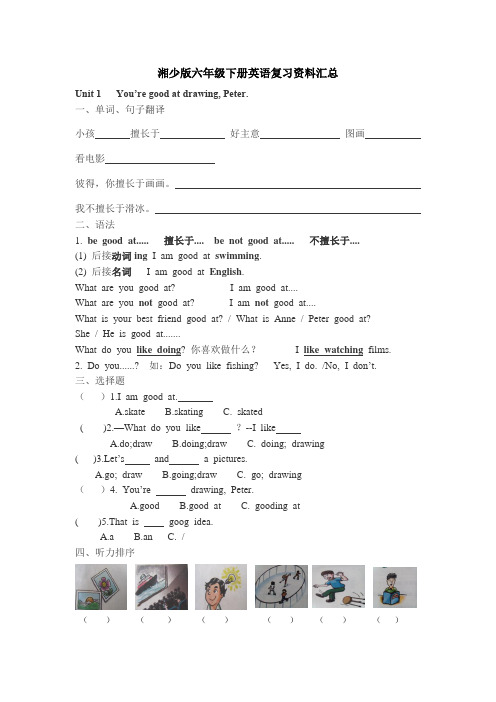
湘少版六年级下册英语复习资料汇总Unit 1 You’re good at drawing, Peter.一、单词、句子翻译小孩擅长于好主意图画看电影彼得,你擅长于画画。
我不擅长于滑冰。
二、语法1. be good at..... 擅长于.... be not good at..... 不擅长于....(1) 后接动词ing I am good at swimming.(2) 后接名词I am good at English.What are you good at? I am good at....What are you not good at? I am not good at....What is your best friend good at? / What is Anne / Peter good at?She / He is good at.......What do you like doing? 你喜欢做什么?I like watching films.2. Do you......? 如:Do you like fishing? Yes, I do. /No, I don’t.三、选择题()1.I am good at.A.skateB.skatingC. skated( )2.—What do you like ?--I likeA.do;drawB.doing;drawC. doing; drawing( )3.Let’s and a pictures.A.go; drawB.going;drawC. go; drawing()4.You’re drawing, Peter.A.goodB.good atC. gooding at( )5.That is goog idea.A.aB.anC. /四、听力排序()()()()()()Unit 2 Anne wanted to skate.一、单词、句子翻译学习溜冰场保持直的跌倒努力做安想溜冰二、语法( 1 ) want to ....... 想要....(后接动词原形)What do you want to do? 你想要干什么?I want to fly a kite.过去时态What did he want to do?He wanted to play computer games.( 2 ) try to ....... 努力、尝试做.... (后接动词原形)Lingling try to skate.二、选择题()1.Anne wanted to A.skate B.skating C. skated( )2. Lingling try to straight. A.keep B.keeping C. keeped( )3.I will again. A.try B.tried C. trying三、听录音,根据你所听到的问句,选择合适的选项回答问题。
六年级下册湘教版英语第一单元知识点
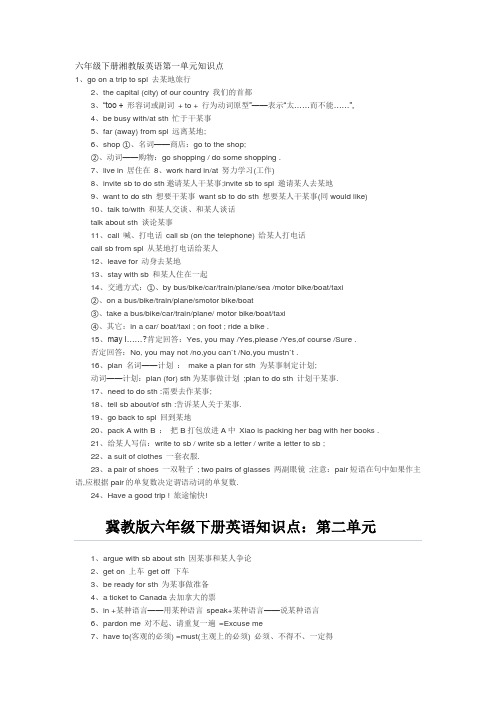
六年级下册湘教版英语第一单元知识点1、go on a trip to spl 去某地旅行2、the capital (city) of our country 我们的首都3、“too + 形容词或副词+ to + 行为动词原型”——表示“太……而不能……”,4、be busy with/at sth 忙于干某事5、far (away) from spl 远离某地;6、shop ①、名词——商店:go to the shop;②、动词——购物:go shopping / do some shopping .7、live in 居住在8、work hard in/at 努力学习(工作)8、invite sb to do sth邀请某人干某事;invite sb to spl 邀请某人去某地9、want to do sth 想要干某事want sb to do sth 想要某人干某事(同would like)10、taik to/with 和某人交谈、和某人谈话talk about sth 谈论某事11、call 喊、打电话call sb (on the telephone) 给某人打电话call sb from spl 从某地打电话给某人12、leave for 动身去某地13、stay with sb 和某人住在一起14、交通方式:①、by bus/bike/car/train/plane/sea /motor bike/boat/taxi②、on a bus/bike/train/plane/smotor bike/boat③、take a bus/bike/car/train/plane/ motor bike/boat/taxi④、其它:in a car/ boat/taxi ; on foot ; ride a bike .15、may I……?肯定回答:Yes, you may /Yes,please /Yes,of course /Sure .否定回答:No, you may not /no,you can`t /No,you mustn`t .16、plan 名词——计划:make a plan for sth 为某事制定计划;动词——计划:plan (for) sth为某事做计划;plan to do sth 计划干某事.17、need to do sth :需要去作某事;18、tell sb about/of sth :告诉某人关于某事.19、go back to spl 回到某地20、pack A with B :把B打包放进A中Xiao is packing her bag with her books .21、给某人写信:write to sb / write sb a letter / write a letter to sb ;22、a suit of clothes 一套衣服.23、a pair of shoes 一双鞋子; two pairs of glasses 两副眼镜;注意:pair短语在句中如果作主语,应根据pair的单复数决定谓语动词的单复数.24、Have a good trip ! 旅途愉快!冀教版六年级下册英语知识点:第二单元1、argue with sb about sth 因某事和某人争论2、get on 上车get off 下车3、be ready for sth 为某事做准备4、a ticket to Canada去加拿大的票5、in +某种语言——用某种语言speak+某种语言——说某种语言6、pardon me 对不起、请重复一遍=Excuse me7、have to(客观的必须) =must(主观上的必须) 必须、不得不、一定得8、look out of 从……向外看out of sth 某物的外面9、here and there 到处、四处10、point to 指向point at指着point out 指出11、at the top of 在……的顶端at the bottom of在……的底部12、try to do sth 努力、设法干某事13、be from spl = come from spl 来自某地14、of course / Sure / Ok 当然16、place of interest /the interesting place 名胜古迹17、enjoy doing sth 喜欢干某事18、hope to do sth 希望干某事hope+宾语从句希望……19、It’s time for sth / It’s time to do sth / It’s time for sb to do sth 该干某事的时候了20、wait for sb/sth 等待某人、某物wait for (sb) to do sth 等待(某人)干某事21、find out 查出、查明fing sb doing sth 发现某人正在干某事22、feel+形容词/ be +形容词:感觉怎么样23、a bowl of /a bottle of /a glass of /a cup of / a can of pop 一碗/ 一瓶/ 一杯/ 一听汽水24、be quiet 安静keep quiet 保持安静25、play a word game 玩一个单词游戏play with sb 和某人一起玩play with sth 玩弄某物如:Don’t play with fire ! 不要玩火!play +球类名词(不要the) play+the +乐器名词(必须要the)如:play the piano26、watch TV / a football match / a movie see a flim 看电影read the book / the newspaper27、show sb sth=show sth to sb 给某人看某物28、take care of = look after 照看、照料、照顾29、look for 寻找冀教版六年级下册英语知识点:第三单元1、Let sb do sth 让某人干某事2、I speak good English = I speak English well .我英语讲得好.3、translate for sb 为某人翻译4、laugh at sth 嘲笑某人fly a kite / fly kites 放风筝5、have fun 玩得高兴have fun (in) doing sth 干某事玩得很开心6、make fun 开玩笑7、hurt one’s +身体部位:hurt my nose / hurt my arm .8、Don’t be afraid . 不要害怕Don’t worry . 不要担心9、be careful / look out 小心、当心10、worry about sth /sb be worried about sth /sb 担心某物/ 某人11、put …… on…… 把……放在……上put……in…… 把……放进……里面put …… down……把……放在……下面12、take one’s picture 给某人照相take a picture /take pictures照相13、用with + 具体工具如:She write a letter to her friends pen .by 通过某种方式She sends messages to her friends postcard14、fall off 从……上掉下来15、help sb do sth / help sb with sth帮助某人干某事16、at the post office 在邮局17、break his tail 折断了他的尾巴18、at the traffic lights 在交通灯的地方19、There be + sb +动词ing 形式+地点(介词短语) 某处有某人正在干某事20、on the left 在左边on the right 在右边21、on the postcard 在明信片上22、in the top、right corner of sth 在…的右上角23、go straight down …… 沿着……直走24、in an hour 一个小时以后25、write sb a letter / write a letter to sb / write to sb给某人写信26、a pair of chopsticks 一双筷子27、send sb sth /send sth to sb给某人寄(送)某物28、buy sb sth / buy sth for sb 给某人买某物29、be late for sth 干某事迟到30、turn left向左转turn right向右转31、begin/start to do sth /begin/start doing sth 开始干某事32、a gift for sb 给某人的礼物33、a kind of 一种all kinds of 各种各样的34、A man who has not climbed the Great Wall is a true man .35、see sb doing sth 看见某人正在干某事(动作正在进行)see sb do sth 看见某人干了某事(动作发生的过程)36、许多many +可数名词much+不可数名词a lot of lots of37、一点、a little +不可数名词一些a few +可数名词some 用于肯定句any用于否定句和疑问句38、put on 穿上、戴上(穿的动作) wear 穿着、戴着(穿的状态)39、turn on 打开9、turn up 调大……turn off 关闭turn down 调小……40、停止干某事stop to do sth 停下来去做另外一件事stop doing sth 停止正在干的事41、在……的前面in front of 在(室外)没有局限空间的地方的前面in the front of 在(室内)有限空间的地方的前面。
湘少版本小学六年级的下册的英语总结复习学习资料汇总.doc
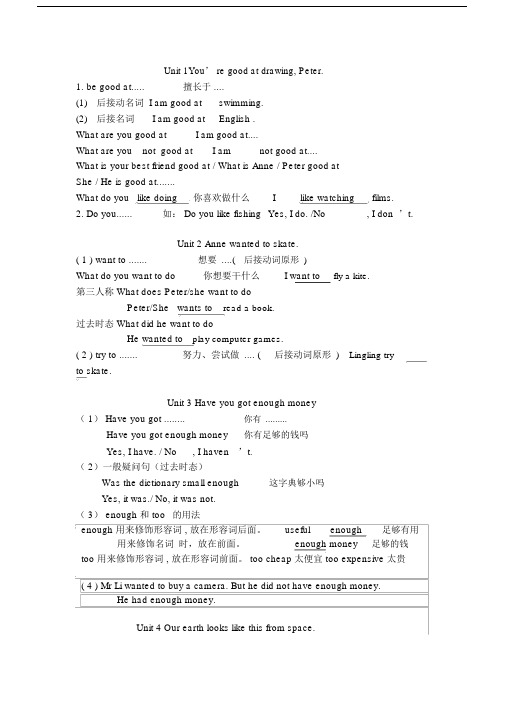
Unit 1You’ re good at drawing, Peter.1. be good at..... 擅长于....(1) 后接动名词 I am good at swimming.(2) 后接名词I am good at English .What are you good at I am good at....What are you not good at I am not good at....What is your best friend good at / What is Anne / Peter good atShe / He is good at.......What do you like doing 你喜欢做什么I like watching films.2. Do you...... 如: Do you like fishing Yes, I do. /No , I don ’t.Unit 2 Anne wanted to skate.( 1 ) want to .......想要....(后接动词原形)What do you want to do你想要干什么I want to fly a kite.第三人称 What does Peter/she want to doPeter/She wants to read a book.过去时态 What did he want to doHe wanted to play computer games.( 2 ) try to .......努力、尝试做.... (后接动词原形)Lingling tryto skate.Unit 3 Have you got enough money( 1) Have you got ........你有.........Have you got enough money你有足够的钱吗Yes, I have. / No, I haven’t.( 2)一般疑问句(过去时态)Was the dictionary small enough这字典够小吗Yes, it was./ No, it was not.( 3) enough 和 too的用法enough 用来修饰形容词 , 放在形容词后面。
2018年湘少版英语六年级下册1-10单元知识点归纳

Unit 1 You are good at drawing, Peter.一、重点词汇1、擅长于……去溜冰看电影好主意最(好)的动名词变化:skate-- 溜冰swim-- 游泳draw-- 绘画 jump-- 跳高playing table tennis -- 打乒乓球fish-- 钓鱼 sing-- 唱歌2、单词表中的单词二、语法要点1、be good at + 动词ing形式表示“擅长于做某事”如:I am good at swimming .我擅长于游泳。
He is good at drawing. 他擅长于绘画。
They are good at playing football. 他们擅长于踢足球。
2、like + 动词ing形式表示“喜欢做某事”如:I like drawing. 我喜欢绘画。
He likes skating. 他喜欢溜冰。
They like watching films.他们喜欢看电影。
三、重点句子你喜欢干什么?我喜欢画画/唱歌/跳舞/打乒乓球/游泳/滑冰/…。
明明喜欢干什么?他喜欢游泳。
你擅长什么?我擅长钓鱼。
你不擅长什么?我不擅长跳高。
安擅长什么?她擅长唱歌。
你最好的朋友擅长什么?他/她擅长跳舞。
Unit 2 Anne wanted to skate.一、单词词组溜冰场想去溜冰试着学不要紧的摔倒保持笔直修理骑自行车好吧二、语法要点1、want/wants/wanted to (do…)想(做……)want/wants/wanted to后面要求用动词的原型如:I want to skate like you. 我想像你一样溜冰。
Anne wanted to learn skating. 安想要学溜冰。
Tingting wants to cycle in the park.婷婷想在公园骑自行车。
2、部分动词过去式want--- 想要 ask--- 问help--- 帮助 try-- 尝试say--- 说 go--- 去fall--- 掉、落三、重点句子安想去溜冰。
湘少版六年级下册英语1-6单元重点知识总结

六年级下册英语重点知识总结Unit 1 A family outing1.family outing家庭郊游2.do things together一起做事3.watch a movie看电影4.go shopping去购物5.take/have a walk散步6.look at the flowers赏花7.have dinner吃晚餐8.go to the beach去沙滩9.enjoy oneself玩得开心10.go to the library去图书馆12. go to the restaurant去餐馆13.shopping centre 购物中心14.have a good time玩得开心15.have lots of fun玩得开心16.each other相互1.Where are we going?我们将要去哪儿?2.Shall we go to the park?我们去公园好吗?3.What are you going to do at weekends?在周末你将要做什么?4.We’ll visit your grandpa and grandma.我们将去拜访你的爷爷奶奶。
5.What are we going to do at the park?我们打算在公园做什么?6.We will ride bicycles and look at the flowers.我们将骑自行车和赏花。
Unit 2 Some stories are more interesting.1.read stories读故事2.a meat shop肉店3.a piece of meat一块肉4.a piece of一块/张/片5.cross the river过河6. drop into掉进...里7.play games玩游戏8.fairy tale童话故事9.magic story魔幻故事10.space story太空故事11.science book科学书12.be good for 对...有好处对两事物进行比较:A+be动词+形容词比较级+than+B.1.That meat is better than mine.那块肉比我的更好。
湘少版小学英语六年级复习知识点

湘少版(湖南少年儿童出版社出版)小学英语教材知识点,使用湘教版小学英语教材六年级的老师应该用得着,这些知识点还就是很全面的,希望对您有所帮助。
1.字母:(大小)辨认、书写顺序;元音字母:A a , Ee, Ii, Oo, Uu2、数字:1~999的基数词与序数词的运用,如计算、购物、时间、日期等。
句型:①What's your number?②What’s the time?③How many pens are there?④How old are you?⑤How much is it?⑥How tall are you?⑦How heavy are you?⑧What time do you get up?⑨When's your birthday?⑩What time did you see him?3、颜色:单词:red, pink, yellow, brown, blue, purple, orange, black, white, green、句型:①What colour is it? ②What’s your favourite colour?4、时间:年、季节、月、星期、日、时刻:Season( spring, summer, autumn, winter)Month: January, February, March, April, May, June, July, August, September, October, November, December、Week: Sunday, Monday, Tuesday, Wednesday, Thursday, Friday, Saturday、Day: 1st May (the first of May), May 2nd ( May the second)句型:见话题2。
5、食品与饮料:人对食品与饮料的喜好;东西方食品。
2019-2020学年湘少版英语六年级下册复习要点1-10单元(已纠错)
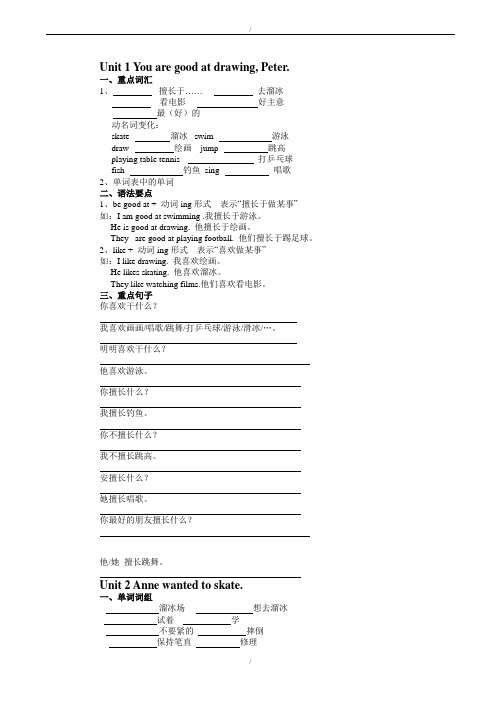
Unit 1 Y ou are good at drawing, Peter.一、重点词汇1、擅长于……去溜冰看电影好主意最(好)的动名词变化:skate-- 溜冰 swim-- 游泳draw-- 绘画jump-- 跳高playing table tennis -- 打乒乓球fish-- 钓鱼sing-- 唱歌2、单词表中的单词二、语法要点1、be good at + 动词ing形式表示“擅长于做某事”如:I am good at swimming .我擅长于游泳。
He is good at drawing. 他擅长于绘画。
They are good at playing football. 他们擅长于踢足球。
2、like + 动词ing形式表示“喜欢做某事”如:I like drawing. 我喜欢绘画。
He likes skating. 他喜欢溜冰。
They like watching films.他们喜欢看电影。
三、重点句子你喜欢干什么?我喜欢画画/唱歌/跳舞/打乒乓球/游泳/滑冰/…。
明明喜欢干什么?他喜欢游泳。
你擅长什么?我擅长钓鱼。
你不擅长什么?我不擅长跳高。
安擅长什么?她擅长唱歌。
你最好的朋友擅长什么?他/她擅长跳舞。
Unit 2 Anne wanted to skate.一、单词词组溜冰场想去溜冰试着学不要紧的摔倒保持笔直修理骑自行车好吧二、语法要点1、want/wants/wanted to (do…)想(做……)want/wants/wanted to后面要求用动词的原型如:I want to skate like you. 我想像你一样溜冰。
Anne wanted to learn skating. 安想要学溜冰。
Tingting wants to cycle in the park.婷婷想在公园骑自行车。
2、部分动词过去式want--- 想要ask--- 问help--- 帮助try-- 尝试say--- 说go--- 去fall--- 掉、落三、重点句子安想去溜冰。
2018湘少版小学英语知识点汇总(K12教育文档)

2018湘少版小学英语知识点汇总(word版可编辑修改)编辑整理:尊敬的读者朋友们:这里是精品文档编辑中心,本文档内容是由我和我的同事精心编辑整理后发布的,发布之前我们对文中内容进行仔细校对,但是难免会有疏漏的地方,但是任然希望(2018湘少版小学英语知识点汇总(word版可编辑修改))的内容能够给您的工作和学习带来便利。
同时也真诚的希望收到您的建议和反馈,这将是我们进步的源泉,前进的动力。
本文可编辑可修改,如果觉得对您有帮助请收藏以便随时查阅,最后祝您生活愉快业绩进步,以下为2018湘少版小学英语知识点汇总(word版可编辑修改)的全部内容。
湘少版小学英语知识点汇总三年级上册一、问候1、-———-—Hello! / Hi! 你好! I’m … . 我是。
2、---—-—What’s your name?你叫什么名字?———-—-I’m… / My name is …我是/我的名字是。
3、-—--—-Nice to meet you. 见到你很高兴.—-—---Nice to meet you too! 见到你也很高兴。
4、———---Good morning. 早上好。
----——Good afternoon. 下午好。
—----—Good evening。
晚上好。
————--Goodnight. 晚安。
5、-—————Goodbye! 再见!—---——Bye-bye!再见!二、谁?1、直接问---———Who are you?你是谁?-—————I'm …我是..。
2、间接问---——-Who is he/she?他/她是谁? -——--—He/She is …他/她是。
--———-Who are they?他/她们是谁? -—--—-They are …他/她们是.。
.三、选择疑问句(是不是?)1 直接问——-——-Are you …? 你是。
.吗?---—-—Yes, I am. / No, I’m not. 是,我是。
湖南六年级英语下册知识点
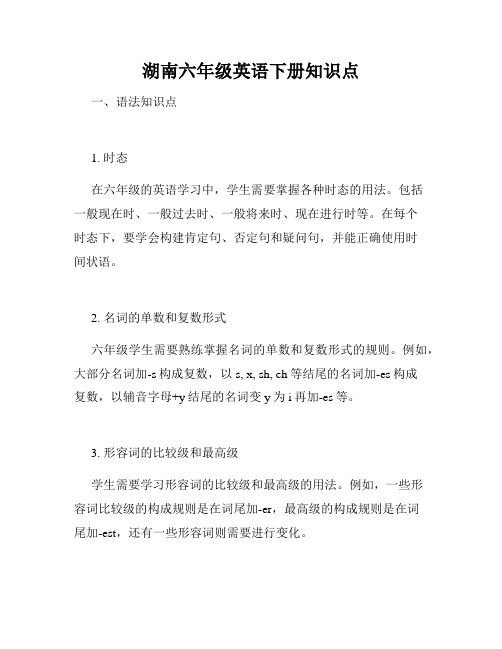
湖南六年级英语下册知识点一、语法知识点1. 时态在六年级的英语学习中,学生需要掌握各种时态的用法。
包括一般现在时、一般过去时、一般将来时、现在进行时等。
在每个时态下,要学会构建肯定句、否定句和疑问句,并能正确使用时间状语。
2. 名词的单数和复数形式六年级学生需要熟练掌握名词的单数和复数形式的规则。
例如,大部分名词加-s构成复数,以s, x, sh, ch等结尾的名词加-es构成复数,以辅音字母+y结尾的名词变y为i再加-es等。
3. 形容词的比较级和最高级学生需要学习形容词的比较级和最高级的用法。
例如,一些形容词比较级的构成规则是在词尾加-er,最高级的构成规则是在词尾加-est,还有一些形容词则需要进行变化。
4. 人称代词掌握人称代词的主格和宾格的用法。
例如,主格用作句子的主语,宾格用作动词或介词的宾语。
5. 动词的进行时态学生需要掌握动词的进行时态的构成形式和用法。
例如,be动词+动词-ing形式,表示正在进行的动作。
二、词汇知识点1. 动词学生需要积累一定的动词词汇量,包括常见的动词和动词短语。
这些动词可以用于描述各种动作和状态,如run, jump, dance等。
2. 名词积累一些常见的名词,如school, friend, book等。
还需要学习一些专业词汇,如数学、科学等学科的名词。
3. 形容词学生需学习一些形容词,用于修饰名词和描述事物的特征。
如beautiful, happy, clever等。
4. 副词学生需要学习如何使用副词,用于修饰动词、形容词和其他副词。
如quickly, slowly, often等。
5. 代词了解人称代词、物主代词、反身代词等的用法和词形变化规则。
三、阅读技巧1. 阅读理解学生需要掌握阅读理解的基本技巧,包括抓主题、寻找关键词、理解词义、推断逻辑关系等。
在阅读时要注意理解文章的整体意思,抓住重点信息。
2. 阅读速度提高阅读速度是六年级学生的一个重要目标。
- 1、下载文档前请自行甄别文档内容的完整性,平台不提供额外的编辑、内容补充、找答案等附加服务。
- 2、"仅部分预览"的文档,不可在线预览部分如存在完整性等问题,可反馈申请退款(可完整预览的文档不适用该条件!)。
- 3、如文档侵犯您的权益,请联系客服反馈,我们会尽快为您处理(人工客服工作时间:9:00-18:30)。
Unit 1 You are good at drawing, Peter.一、重点词汇1、擅长于……去溜冰看电影好主意最(好)的动名词变化:skate-- 溜冰swim-- 游泳draw-- 绘画 jump-- 跳高playing table tennis -- 打乒乓球fish-- 钓鱼 sing-- 唱歌2、单词表中的单词二、语法要点1、be good at + 动词ing形式表示“擅长于做某事”如:I am good at swimming .我擅长于游泳。
He is good at drawing. 他擅长于绘画。
They are good at playing football. 他们擅长于踢足球。
2、like + 动词ing形式表示“喜欢做某事”如:I like drawing. 我喜欢绘画。
He likes skating. 他喜欢溜冰。
They like watching films.他们喜欢看电影。
三、重点句子你喜欢干什么?我喜欢画画/唱歌/跳舞/打乒乓球/游泳/滑冰/…。
明明喜欢干什么?他喜欢游泳。
你擅长什么?我擅长钓鱼。
你不擅长什么?我不擅长跳高。
安擅长什么?她擅长唱歌。
你最好的朋友擅长什么?他/她擅长跳舞。
Unit 2 Anne wanted to skate.一、单词词组溜冰场想去溜冰试着学不要紧的摔倒保持笔直修理骑自行车好吧二、语法要点1、want/wants/wanted to (do…)想(做……)want/wants/wanted to后面要求用动词的原型如:I want to skate like you. 我想像你一样溜冰。
Anne wanted to learn skating. 安想要学溜冰。
Tingting wants to cycle in the park.婷婷想在公园骑自行车。
2、部分动词过去式want--- 想要 ask--- 问help--- 帮助 try-- 尝试say--- 说 go--- 去fall--- 掉、落三、重点句子安想去溜冰。
安想去溜冰吗?是的,她想。
安想去干什么?你想去溜冰吗?不,我不想。
我想像你一样溜冰。
我想要站直。
安想要学溜冰。
你是怎样滑冰的?这个周末你想要干什么?我想要去钓鱼。
Unit 3 Have you got enough money?一、单词词组看着当然足够的贵的脏印、污点卖书店立刻、马上词典最后二、语法要点1、enough + 名词表示足够多的某东西。
如: enough money 足够的钱enough time 足够的时间enough water 足够的水2、形容词+ enough 表示“足够怎么样的”如: useful enough 够有用的small enough 够小的cheap enough 够便宜的3、复习 too + 形容词表示“太过于怎么样的”如:Your horn is too big. 你的角太大了。
It looks too ugly. 它看起来太丑了。
the car was too old. 这小车太旧了。
它的意思等于第2点的意思。
即:too + 形容词 = 形容词 + enoughtoo big = big enough三、重点句子1、你有足够的钱吗?是的,我有。
不,我没有。
我仅仅只有45元。
2、她只有45元钱。
3、它够有用吗?4、它够小的。
5、它的封面上有个脏印。
6、我能看看那本字典吗?当然。
7、我能把它放进我的书包里。
8、安在一个书店里看到了本字典。
9、安想要买一本字典,但是她没有足够的钱。
Unit 4 Our earth looks like this from space.一、单词词组看起来像太空博物馆天花板在天花板上对…感兴趣的谈论陆地和海洋天空地球灯星星二、语法要点look like ……表示“看起来像……”如:The tree looks like a man. 这棵树看起来像个人。
The cloud looks like a dog. 这朵云看起来像只狗。
The river looks like a dragon. 这条河看起来像条龙。
三、重点句子我们的地球从太空中看就是这个样子。
它看起来像天空。
皮特对这部电影非常感兴趣。
屋顶上有许多灯。
你对什么感兴趣?我对太空故事感兴趣。
他们正在看电影。
你能看到陆地和海洋。
一个人谈论着这部电影。
这个影子看起来像一只狗。
Unit 5 There are more shops in Picture One.一、单词词组fewer 更少的(可数) more 更多的less 更少的(不可数) similar 相似的different 不同的 the same 相同的二、语法要点比较数量的多少分两种情况:1、比较可数名词的数量,表示“比……更多”是用more,表示”比……更少”用fewer。
如:There are more shops in Picture One.在图一中有更多的商店。
There are fewer people in Picture Two.在图二中人更少。
2、比较不可数名词的数量,表示表示“比……更多”也是用more,表示”比……更少”则用less。
如:There is more cheese in my fridge.我的冰箱里有更多的奶酪。
There is less milk in her fridge. 她的冰箱里牛奶更少。
三、重点句子In which picture are there fewer people?哪幅图片人更少?There are fewer people in Picture Two.图二中人更少。
In which picture is there less rain? 哪幅图片中雨更少?There is less rain in Picture One. 图一中雨更少。
Unit 6 Some stories are more interesting than others 1.重点词汇_____________读故事书 ___________从前_____________ 一块肉 ___________走过_____________ 在水里 ___________掉下_____________ 穿过 ___________在``附近_____________ 屠夫 ___________桥_____________ 另一个 ___________其他的2.动词过去式is /am_______ 是 are______是 give_____ 给take_____ 带 carry______ 叼 walk______ 走think______ 想 get______ 得到 open______ 打开want______ 想 drop______ 掉下 lose______丢失3.语法like + 动词 ing形式 I like reading.1.There be句型``There was a dog. There are desks.2.be going to do sth.将要做某事I am going to get it.3.want to do sth想要做某事 I want to eat ice-cream.4.重点句子1.他喜欢一些书多过其它书。
2.一些故事比另外一些更有趣。
3.一个屠夫给了这条狗一块肉。
4.狗叼起肉把肉带回家。
5.狗的附近有条河,河上游桥。
6.它看到水里有另一条狗。
7.那块肉比我的好。
8.狗丢失那块肉。
Unit 7 The most interesting stories.1.重点词汇_______借 ____________太空故事 __________最多_______最少_________最无聊___________童话故事___________图书管理员___________返还2.语法最高级:最多的 the most + 形容词They are the most boring stories.最少的 the least + 形容词They are the least interesting stories.3.重点句子。
2.我们想借一些书。
3.我喜欢太空故事。
4.太空故事是最有趣/最无趣/最乏味的故事。
5.我不同意。
6.大部分太空故事都像童话故事。
湘少版英语6年级下册unit8复习要点Unit 8 The Dragon Boat Festival.1.重点词汇_____________粽子___________美味_______猪肉______坚果_______期间________________端午节_____________龙舟赛_________纪念_______著名的________诗人________诗歌_____________阴历月份__________流传 _________死去____________跳进`2.动词过去式hold-- 流传 love-- 爱 write-- 写rule-- 规则 jump-- 跳 come-- 来die-- 死亡 throw-- 扔 will-- 将会3.语法特殊疑问句(特殊疑问词: why原因 what事情 when时间)Why do we eat rice dumpling? 为什么我们要吃粽子。
What are these? 这些是什么?When is the Dragon Boat festival?端午节是什么时候?It’s on the fifth day of the fifth lunar month. 4.句子1.这些是什么?这些事粽子。
3.粽子里面放了肉。
4.为什么我们要在端午节吃粽子。
5.为了纪念著名诗人屈原。
6.端午节是在五月初五。
Unit 9 What can I do ?1.重点词汇___________从··出来 _________追赶___________钱包 _____________掉下_________注意_____________公共汽车费_________ 能 ______________走向2.动词变名词come-- catch--drop-- notice--walk-- hold—3.语法Can 情态动词的用法:情态动词+ 动词原形What 的特殊疑问句:What can I do ? 我该怎么办?回答:You can ……….4.句子。
1.玲玲从学校出来。
2.玲玲的钱包从她的包里掉了出来。
3.我没钱坐公共汽车。
4.我能走回家。
5.一个男孩走向她们。
6.他把钱还给玲玲。
Unit 10 Tomorrow will be rainy.1.重点词汇sun—sunny 晴朗的 rain—rainy 下雨的cloud—cloudy 多云的 wind—windy 多风的Sunday Monday Tuesday WednesdayThursday Friday Saturdaylisten to 听 weather forecast 天气预报stay 呆在 heavy 重的 light 轻的strong 强大的 get wet 淋湿 hate 讨厌2.语法将来时: will be 句型(will + 动词原形)将要···否定形式:won’t be+ 动词原形不会··· be going to + 动词原形Tomorrow will be rainy.= Tomorrow is going to rainy.It’s will be a sunny day.There won’t be heavy rain.3.句子1.东东7岁了。
